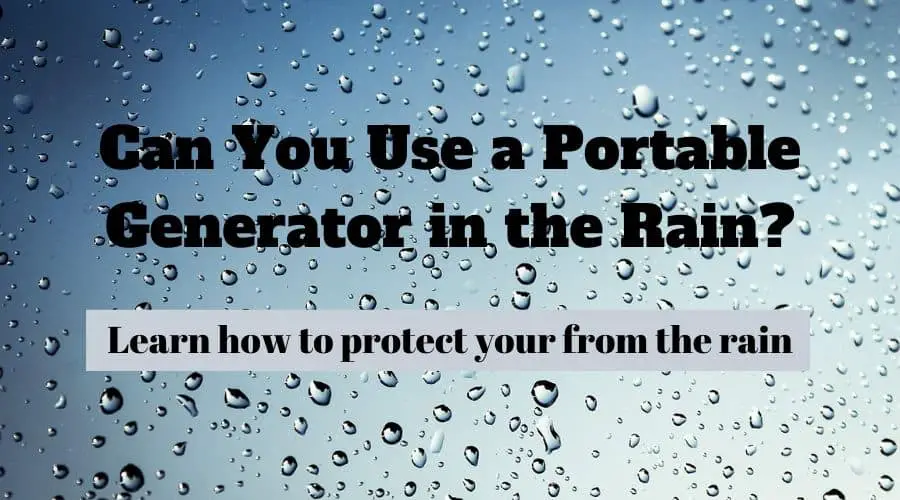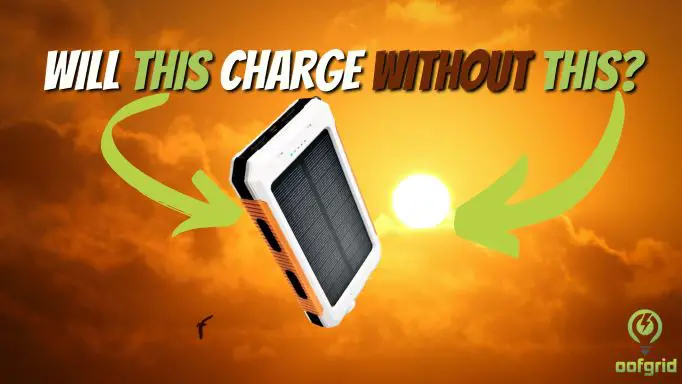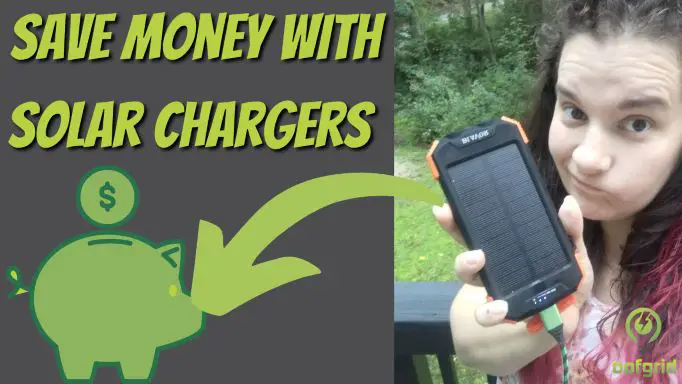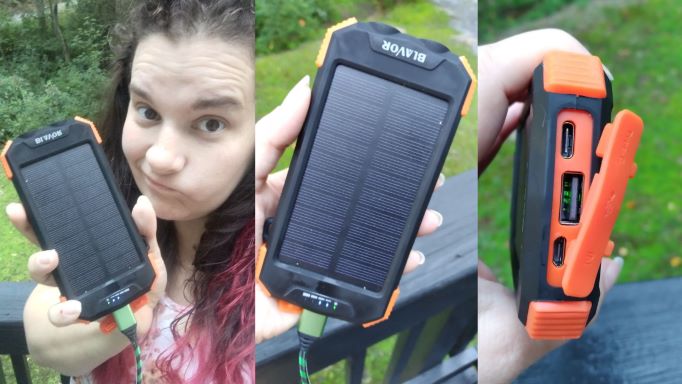The answer is that it depends on the generator and the conditions in which you’re using it. For example, a generator designed to operate in the corner of your garage, probably cannot safely be used in the pouring rain unless it is in a protective housing.
There are plenty of generators that can be used outside of your home if they are not exposed to the elements for long periods of time.
Let us take a look at some of the reasons why you can or can’t use a portable generator in the rain.
Contents
What Types Of Generators Can Be Exposed To The Elements?
Most portable generators are not made to withstand the elements, whether it is rain, sleet or snow. In most cases, any moisture that seeps into the generator can cause corrosion or electrical shorts.
This is why throwing a tarp over a temporary frame is rarely enough to protect your generator in the rain or during a storm.
Outdoor generators are designed to be left outside. A classic case is the RV generator on a trailer that sits inside a protective housing. It is designed to sit outside in any kind of weather.
Another example is the backup generator for the suburban home with a protective metal housing. It is possible to find outdoor generators you could use outside without a protective housing, but even these may have their limits.
Cover Options
Table could not be displayed.How Can You Use A Portable Generator In The Rain?
One option is having it run in an outbuilding, away from your home and protected from the elements. You could also build a permanent cover, though it is hard to do this in time when you see a storm brewing.
You could build the generator a cover out of brick or plywood. We’d recommend against using plywood since it is flammable. And whatever design you use, it must allow the unit to have enough airflow to not choke the engine or cause the unit to overheat.
Another option for using a portable generator in the rain is to set up a dedicated wet weather cover. This is essentially a mini-tent for the generator. It provides protection from the elements, but it won’t interfere with the airflow the generator needs. And you can take it with you when you travel.
This is a far better solution than running a generator inside a pup tent since the pup tent isn’t designed to vent exhaust.
You could buy a metal generator enclosure, too. These are sturdy and simple, though you have to choose one that actually fits around the generator. A side benefit of the generator cover is that it essentially hides the generator from passersby. The downside of metal enclosures is that they aren’t very portable unless it is built into a trailer.

What safety precautions should you take when using a generator in the rain?
Whether you have an indoor or outdoor generator, place it on a dry surface. If there is any risk of flooding, have the generator sit on a raised platform. Only use extension cords that are designed for outdoor use. Prevent the extension cords from getting submerged, as well.
The generator’s outlets and control board must be protected from the elements. That’s why many protective measures fall short.
For example, you should not attach umbrellas to the generator frame to try to protect the outlets on the generator. While you are ensuring good ventilation, there’s nothing to protect the side panels from water.
Whatever shelter you use to protect the generator in the rain, it should be secure. There’s no point setting up a tarp or other shelter that could blow away in the wind, exposing the generator to the elements.
A rough structure that falls down around the generator creates a different problem. If the wooden or plastic support holding up a quickly built tent collapses around the tent, the generator may lose the airflow it needs to run smoothly.
Our Recommendation: Generator Tents
Purpose designed generator tents fit most models and are designed to be universal with all makes and models of portable generators.
Made from 100% waterproof material which is also fire retardant makes these the best option for protecting your portable generator from the rain.
These generator tents contain a self-attaching clamping system that allows you to mount it on your generator without having to use any additional tools. No struggling in the rain to quickly pitch them up.
Setting up the generator tent, including clamping, framing and covering only takes a matter of minutes. Dismantling and storing is also a simple process.
Running your generator in the rain and severe weather, safely, while protecting your family and investments from harm, can only be a good thing.
Fire Hazard
You run the risk of the motors overheating. Then you could see your plywood structure catch fire in the pouring rain, while you lose power to your home.
Note that this is an issue even if the generator has a metal frame around it to make it more portable. That frame may elevate the generator off the ground and prevent it from sitting in a puddle, but it won’t prevent debris around the generator from cutting off its airflow.
Keep your generator off the ground
You could put plywood on the ground under the generator to lift it up off the ground. Try to keep the generator level while doing this.
Don’t let anything plugged into the portable generator get wet, either. For example, a smartphone plugged into the generator sitting under a shelter is as prone to damage if it gets wet as the generator itself.
Use Surge Protectors
Surge protection becomes paramount during bad weather. You don’t want a surge from the generator to destroy sensitive electronics like the control panel in a smart fridge. And you don’t want a lightning strike to your house to end up blowing up the generator’s fuses.
Use surge protectors when connecting the generator to your home, and check all of the fuses in the house and generator before turning it on.
Put the generator on a level surface, where there is no standing or flowing water. You don’t want to have the generator protected from the rain only to have it get equally wet as the runoff from the roof flows under it.
Can I Cover A Generator With A Tarp To Protect It?
You can create a quick canopy for using your generator in the rain, with a canvas tarp. However, you need to ensure that no moisture will get into the sensitive sections of the generator. Furthermore, you cannot have the tarp completely enclose the generator.
If you cut off its supply of fresh air, it will eventually be unable to run, whether it relies on gasoline or propane.
You could try to protect the generator with a boat canopy if it is open on all four sides. The issue here is ensuring adequate ventilation. Just make certain that the boat canopy doesn’t close up around the generator or blow away.
Can I Protect The Generator With A Generator Cover?
No. The factory-supplied generator cover is intended to protect your generator whilst in storage. For example, it protects the generator from dust and insects.
Do not operate the portable generator with the cover intended to protect it while it is in storage. They don’t allow for proper airflow, and they aren’t made to withstand the heat.
Can I protect The Generator With A Shade Canopy?
A shade canopy is designed to provide protection but only from rain falling straight down. Your generator’s most sensitive components tend to be on the side of it, including the power outlets and control panels.
High winds will blow water into these areas. You risk electrical shorts in the short term and rust in the long-term. The only exception is if the shade canopy is so large that rain can’t reach it, such as when you have a large canopy spanning the length of a deck.
Note that you can run a generator sitting in the middle of the average carport for the same reason.
Can I run a generator in bad weather by protecting it with a tarp hanging from a tree?
It is not advisable to try to protect the generator with a tarp hanging off of a tree. It introduces every possible threat to the generator and then some. The tarp could blow away.
The tree branch could break, pulling back the tarp if the branch doesn’t land on the generator. The tarp could get blown back and tangled up in the branches. Now the generator is fully exposed to the elements.
There is also the slight risk the tree is struck by lightning, creating a fire hazard. A greater danger is having the generator and fuel around the tree itself.
Gasoline and oil seeping into the soil can harm trees. On the flip side, the soil will absorb the petrochemicals, so you can’t clean up any oil and gas leaking out of the generator and you may not realize there is a leak until the generator stops running. The harm to your generator and the trees and natural environment isn’t good.
Can I Run A Generator In The Garage If It Is Raining?
In theory, yes, because the walls of the garage offer protection from the elements. The danger is that the exhaust from the generator will build up over time, creating a suffocation hazard.
Leaving the garage door open reduces this risk but doesn’t eliminate it. A carbon monoxide detector is essential in this case, and you have to ensure that the exhaust from the generator isn’t directed toward the door into your home.
Does Temperature Matter? Do I Need To Protect A Generator From Snow?
Does your generator need to be protected from extreme cold as well as the rain? If it is sleeting, the sleet itself is already wet enough to damage sensitive electronics. Furthermore, snow and ice that fall on a generator will melt in contact with the hot motor housing.
The precipitation will turn into a liquid that can damage sensitive electronics. This is why you want to protect any generator from the elements but especially an indoor generator, even if it is just snowing.
The generator’s main components should be located off the ground for the same reason. A warm running generator will melt the icy ground it is sitting on, and you don’t want water or mud getting into the generator’s interior.
Does An Inverter Generator Need To Be Protected From The Rain?
Yes, because the sensitive electronics in it are at risk if it gets wet. The inverter generator needs as much airflow as a conventional gas generator when running. If the generator is off and you’re only drawing power from the inverter/battery, then you don’t have to worry about airflow.
So, What’s The Best Way To Protect A Portable Generator From The Rain?
Build a suitable wooden or metal enclosure that has good ventilation and protection from the elements.
Choose a budget portable power generator that has some form of weather protection to start with, just in case some water does hit your generator. Portable Power Stations, for example, are not suitable for wet weather and are more sensitive than a Gasoline generator.
Summary: Can You Use A Generator In The Rain?
The answer to this question is ‘Yes’, you can use a generator in the rain – if you use proper care and attention and ensure that a good protective cover with good ventilation is used.









